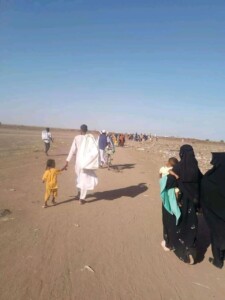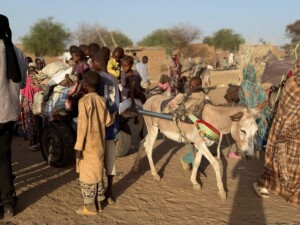West Darfur Wali: Security improving, humanitarian situation still dire
According to West Darfur Wali (Governor) Khamees Abakar, the security situation in the state is gradually improving. The humanitarian situation however is still dire.
Following his meeting with Lt Gen Mohamed Dagalo ‘Hemeti’, Vice-President of the Sovereignty Council* yesterday, the West Darfur governor told reporters in Khartoum that the Eid El Adha passed peacefully for the first time in years.
 Newly displaced shelter in a school yard in El Geneina, January 2021 (Social media)
Newly displaced shelter in a school yard in El Geneina, January 2021 (Social media)
According to West Darfur Wali (Governor) Khamees Abakar, the security situation in the state is gradually improving. The humanitarian situation however is still dire.
Following his meeting with Lt Gen Mohamed Dagalo ‘Hemeti'*, Vice-President of the Sovereignty Council yesterday, the West Darfur governor told reporters in Khartoum that the Eid El Adha (Feast of the Sacrifice – end July) passed peacefully for the first time in years.
West Darfur is recovering from many complex problems, Abakar said. The state government has sent a joint force of 71 vehicles to protect the current agricultural season in eight localities.
A reconciliation committee has been formed consisting of young native administration leaders and activists from various tribes. The committee, chaired by Masalit Sultan Saad Abdelrahman, “is now advocating the importance of the success of the agricultural season and peaceful coexistence”.
Tribal violence
In end December and again in April, hundreds of people were killed in attacks on the West Darfur capital El Geneina and the adjacent Kerending camps as Arab tribesmen targeted Masalit people. Thousands of people fled their homes.
Many militant Arab herdsmen who committed the violence reportedly drove in RSF vehicles. In July, attacks on Misterei, south of El Geneina, left dozens of people dead. The attackers torched a third of the town. Thousands of people fled.
The UN Office for the Coordination of Humanitarian Affairs (OCHA) in Sudan reported in May that the Hay El Jebel neighbourhood in El Geneina was like a ghost town. Following the repeated attacks on El Geneina, fear prevails among the Masalit, who consider West Darfur their traditional homeland, and Arab tribesmen. People of visibly Masalit appearance do not go to areas inhabited by Arabs and vice versa out of fear of being attacked.
‘Still living rough’
The wali described the humanitarian situation in West Darfur as “extremely bad”, pointing to the weak response of Khartoum to the declaration of El Geneina as “a disaster area” in April.
There are still a large number of displaced people in 137 shelter centres, set up in schools and government institutions, the governor said. “No great progress has been made in addressing the humanitarian situation, especially in providing shelters.”
He said he hopes that the shipload with aid items sent by the United Arab Emirates (UAE), to be dispatched on Monday, “will bring relief to the many displaced suffocating in the makeshift shelters” – though the 1,600 UAE tents will not be sufficient.
A government convoy with humanitarian aid is scheduled to arrive on August 25.
* Hemeti is also Commander-in-chief of the paramilitary Rapid Support Forces (RSF) set up by the ousted Al Bashir regime in 2013 to replace the various janjaweed militias fighting the rebel movements in the country.
Officially, the RSF was integrated into the Sudan Armed Forces in August 2019. At the same time however, the militia stayed a force unto intself.
In August 2019, the then ruling Transitional Military Council and the opposition Forces for Freedom and Change, signed the Constitutional Charter that stipulates that both the Sudanese army and the RSF will fall under the command of the “Supreme Commander of the Sudan Armed Forces”.
In the Juba Peace Agreement, signed by the Sudanese government and the Sudan Revolutionary Front (a coalition of various rebel groups) on October 3 last year, it was agreed that the rebel combatants as well as the RSF will be merged with the army.











 and then
and then